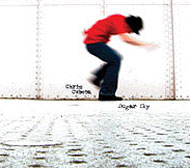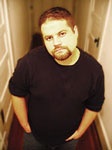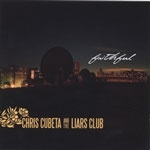Features
Chris Cubeta: The Interview
by Jason Warburg
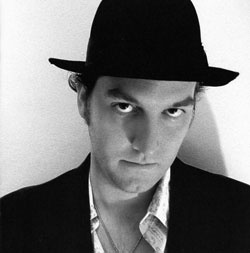
The struggle in finding adjectives to describe Chris Cubeta's talent involves balancing obvious choices like "exceptional" and "brilliant" with the desire not to put too much on the shoulders of a guy who is just beginning to find his audience. Composer of heartfelt, sharp-eyed roots-rock songs that somehow also retain a dreamlike universality, he is the author with his good friend Danny Lanzetta of two CDs’ worth of absolutely terrific music, 2003’s Sugar Sky and more recently the July 2006 release Faithful. An admirer of artists like Pearl Jam, Bruce Springsteen and Lucinda Williams, Cubeta keeps it real in his lyrics, his music and his interviews. Our discussion ranged from the rollercoaster nature of the creative process to how you build a following as an indie artist, from the origins of individual songs to why we bother creating art at all. It’s the only interview I’ve ever done that felt like it was over way too soon. Chris Cubeta is the genuine article in every respect, and a creator whose audience -- if there is any justice in the universe -- will one day catch up with the size of his abilities as a composer, singer, player, producer and all-around creative talent.
Daily Vault: How's the response been so far to Faithful? I know you’ve been working it for about a month now, playing shows in the
Chris Cubeta: The response has been basically fabulous. Everyone that we’ve gotten the record to has loved it – the small fan base that we have, family and friends, and the people we know in the industry. We’ve gotten a tremendous response at the last four or five shows we’ve played -- the band is really coming together live. When we get in front of a big audience, by which I mean 100-200 people, we usually end up selling 20 or 30 CDs, which to me is a good sign. I like to think if we were in front of 5,000, we might sell 1,000 in one night. Getting to new fans and new audiences is the bulk of the work right now. We’re trying to target the
I understand Sugar Sky wasn’t technically your first CD like I thought it was when I reviewed it.
I was a member of a band for years, since I was in high school, and we put out a couple of CDs, and I’ve produced a lot of records for other people. [Editor’s note: Including Frank Carillo, reviewed on the Vault.] Sugar Sky was really my first foray into the singer-songwriter-slash-frontman realm. I’d always been more of a behind-the-scenes guy, a studio guy and a guitar player, not a mouthpiece for a band. But then my best friend and lyric partner [and co-producer of Sugar Sky and Faithful] Danny Lanzetta said “You’ve got all these songs, man, and recording equipment and the ability to make a record. You shouldn’t be looking around for a singer, you should just sing your own songs.” So even though I never really wanted to be a frontman, that’s where we are now.
That’s a nice thing to hear, because it’s still something that I struggle with. I’ve worked with a lot of singers in the studio and I know how I want to sound. But it’s difficult when you hear yourself back on tape, at least for me. You’re so exposed and your emotions are so on your sleeve that it can be very unnerving hearing it coming back at you -- not because of the way it sounds, but because it’s so revealing. For lack of a better example, the only thing I can compare it to is that it’s like walking into a crowded room naked. It’s very unnerving, but it’s also exhilarating when someone tells me that I’ve connected with them. That makes it worth it.
What I get from your albums is that you’re singing like you mean every word, and every word is important. A lot of acts that are looking for commercial success sound like they’re focused on that, instead of really investing themselves in the song.
I grew up listening to acts where I connected with what they were singing and what they were playing on an emotional level. I like intellectual music, but for me it was always first – not more, but first -- about emotional connection. And that’s something that I’ve always tried to remain true to. I’m hoping to have some sort of success, too -- just enough to support myself and my wife and my good friend and my band. Nothing too fancy! But I’ve always tried to remain true to the art form as much as possible, and also to make sure that it translates to other people. My goal is pretty much to do what music had done for me, for other people. It’s really been a savior in my life since I was a young child. And hopefully somewhere along the way, this music will affect someone to that extent.
A worthy goal. About your songs -- they tend to pack in details, but still feel impressionistic and dreamy in places. To me, that gives them kind of a timeless, universal feeling. Do you feel like there’s a secret to writing like that? Or is that just how it comes out for you?
You know, there’s no secret to it. The one thing is, I would love to be able to be more prolific than I am right now, and than I’ve been over the last couple of years. A lot of that is due to circumstances -- I spend a lot of time making records with other artists, so usually time is too short to write as much as I’d like to. As far as theories about songwriting, Stevie Wonder used to say he would write a song every day. And somewhere along the way he came out and said he wrote a lot of shitty songs -- but he also wrote a lot of great ones. For me it’s always been about just capturing a moment, sitting down with a guitar or a piano and really connecting with a certain moment in time and space. It can be a big moment in my life, or a small moment, or just a random moment in the middle of a day that doesn’t really have any meaning. The key is this very small burst where you feel very connected and willing to let something out, and usually those moments come naturally and spontaneously.
I wish I had more control over that, but when they do come it’s very important to embrace that -- and then the work kicks in. That’s the easy part usually, getting the spark or the germ out. The hard part for me, and I think for a lot of artists, is taking that spark and saying, how can I make this into something that other people will understand and connect with? That can be in terms of just finishing off a song, or trying to create a story around a specific moment that people can relate to. I also co-write a lot of my lyrics with Danny, who is a tremendous writer and poet and novelist, and he sometimes is able to help me hone in on some of those moments and tie them into something that maybe can translate to the rest of the world.
As a writer, I’m always interested to hear how other people’s creative process works. I know just what you mean about that moment of connection and inspiration. It can feel incredible.
I love it. For instance, there’s a song called “Clementine” on the record that is probably my favorite song that I’ve ever written, and it has a story behind it. Danny and I actually took a trip right after the New Year, we left on New Year’s Day from
Sometimes it can be frustrating while you’re waiting for it to come, but when it does, it’s amazing. The hard part is, when it’s not there you feel like it’s never going to come back. There’s times when I tell myself “I’m never getting that back. I wrote my last song, it’s never happening again.” Knock on wood, so far that hasn’t happened in my 10 or 12 years of doing this. I always find one more, you know? It’s the reason -- besides the people in my life and the support that I have, which is huge -- that I get up in the morning.
Talking about composition and where the songs come from, I know you play a lot of instruments. Is there one in particular you’re most comfortable writing on?
I write 95 percent of my material with a guitar in my hands. Which is funny because I actually grew up playing piano, which was my first instrument as a kid. When I got to be a teenager, I found guitar and fell in love with rock and roll. I’ve always found guitar to be a little bit more of an expressive instrument for me. That said, piano and drums are two instruments that I play quite often and there are certain times and certain aspects of composing where they’re really helpful.
Back to the new album. I know on Sugar Sky you played most of the instruments yourself, and for Faithful you had a band working with you. How did having a band in the studio change things in terms of your creative process and the making of the album?
Sugar Sky was quite an amazing experience because, since I have the ability to play all four of the basic instruments well enough to put them down on record, I was in total control of that album, and I made it in a very haphazard way simply because I could. I pretty much did the whole album in my basement when I lived upstate. I would just go downstairs into my basement and decide to do a drum track and if it came out, it came out.
That being said, I don’t think of either one as being a better or worse experience, they were both fantastic in different ways. The band on the new album [Editor’s note: John Passineau on bass and background vocals, Jeff Berner on guitars and background vocals and Marc Capaldo on drums and percussion] has been nothing short of astounding. I’ve known John for many years and the other two guys, Jeff and Marc, who are the newer guys in the band, have become very good friends of mine and their contributions on the album have been priceless.
As for the future, I’m going to do a small EP in the fall that might be ready for the holiday season. That will probably be four or five songs with just me and a guitar. That’s been something I’ve been wanting to do also -- strip it down and try to capture a couple of songs that are as bare bones as possible. I’ll record live with no overdubbing and no additional musicians or anything like that. So then I’ll have the full range -- an album I did playing all the instruments, a band album, and an EP of just me and a guitar or a piano, very sparse.
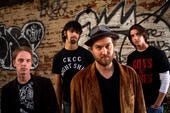
Chris Cubeta & The Liars Club
One of the things I really enjoyed about both albums is that you do pace them to build and fall back. On both Sugar Sky and Faithful you’ve got some band songs that have a strong build to them, and then you’ve got some quiet, sparse ones.
I’ve always liked records that have that dynamic. I grew up listening to albums, but I know in this day and age with the iPod generation -- which I am a part of -- it’s a little different. People are almost creating their own albums using playlists. In some ways it’s very cool -- I think it’s a neat technology if it’s not abused, but by the same token it’s a little bit troublesome for me because the art form of the album is not quite as important as it used to be, and I think it’s still a very valid art form.
Ironically, my song “Me And The Radio” is about how much I love hearing a new song on the radio. The tagline at the end of the song is, “It’s still my favorite way to hear a song.” I can remember when I was a little kid driving in the car with my father and a song I knew would come on the radio and you had no control over it and if you caught it at the beginning and you had two and a half verses left and the chorus, you were psyched. Still occasionally in this day and age, I’ll turn the radio on and hear a song that I love or something new that’s out that I haven’t heard before, and it’s still something that I cherish. So I have these two sides -- obviously I love albums, but I really do love just a great song that happens to hit you at the right moment.
I think the thing about the radio is you feel like there must be a bunch of other people out there who are listening at the same time and feeling the same thing that you are, so it’s kind of a group experience.
Absolutely, it’s a special feeling, less isolated. That’s a really neat aspect of radio which I hope will survive all this technology and b.s. that’s going on in the music business.
Do you feel like there’s a particular theme or idea that the Faithful album is built around? I commented on the title in my review in terms of being faithful to a songwriting tradition.
We actually didn’t have a title until a few days before we sent the artwork out to be printed. The title of the record is somewhat ironic. It might not be obvious, but I’m not a huge proponent of organized religion. I was raised Catholic, with Catholic guilt and these ideas of abstract faith that I’ve spent a lot of my life pushing away because I’m a believer in free thinking and intellectual learning and things like that. We called the record Faithful because after all these years, I still have faith in music and art. For some reason, I and the few people who are very close to me have a tremendous amount of faith in it, not only in what we do but in what other people do with music and the arts and moviemaking and literature and poetry. It’s very difficult at times in this society to continue doing it, so it does require a tremendous amount of faith.
This is a classic cliché interviewer question, but what the hell: what musical artists, past and present, do you admire the most?
Pearl Jam is number one, without a doubt. They have been the biggest influence in my musical life. They were the band that, when I was 13 or so in junior high school, changed music from something I did into something I was becoming a part of. For the last 14 years I’ve been a diehard fan. Obviously also Springsteen. Tom Petty is a huge influence. Dashboard Confessional in recent years has actually been a big influence; they’re one of the few bands I’ve heard in a long time that really has no gimmicks, they just go out and play with no pretensions. Wilco is a big influence. Lucinda Williams in the last three or four years has been one of my biggest influences as a songwriter, particularly her albums Car Wheels On A Gravel Road and Essence.
In the last four or five years, as big an influence on me as anything has been hip-hop, which people generally find pretty surprising. I am a diehard Jay-Z fan, to the point where I have every record and know each of them inside and out, and in my own private moments can rap along with them. Eminem also, in the way that he’s been able to express himself honestly, right or wrong. Hip-hop is a different culture for me, in that I was raised in a pretty lily-white suburb in upstate
What are your goals for the next six months?
The next six months, our goals are to keep playing live around New York and to get the record into as many people’s hands as possible -- fans, people who come to our shows, and as many people within the industry as we can, artists who are doing something similar who might take a liking to what we do. Over the holidays we’re going to playing a big benefit show for an AIDS charity. We’ve been doing this for years for a good friend of ours upstate, a man living with AIDS who runs a very small organization that constantly gets its funding cut by the government, and we’ve been able to occasionally raise $500 or $1,000. This year we’re hoping, since we’re based in
And then we’ll continue working, maybe pushing out to play in Boston and places around there, and then in early spring if we don’t have a deal or don’t have something bigger happening, we’re going to do our own tour. We’re trying to save for that right now so we can buy a van and try to do half the country in a month or so on the road. After that, we’ll come back to
Let’s take that one step further. Imagine it’s next spring, the album’s started heating up and you get offered an opening slot on somebody’s summer tour. In your dreams, who’s the headliner?
Pearl Jam, without a doubt. I love Springsteen and I love Dylan and all these guys, and obviously we wouldn’t be here without them, but if I ever got to set foot on a stage and play some music with any of those guys, particularly Eddie Vedder, I could probably drop dead happy right then and there. As big as they are and as unreasonable as the idea is, they’re one of the bands who I feel like, if they ever actually either got to see us perform or got to really hear the record in a good situation where they could spend time with it, they would really get what we do. Because they come from a very similar place of just trying to be honest, and I think that they’ve done that their whole career.
[Many thanks to Chris Cubeta for his generosity with his time and to Danny Lanzetta for his assistance with arrangements. Make sure to visit Chris and Danny at www.chriscubeta.com]
